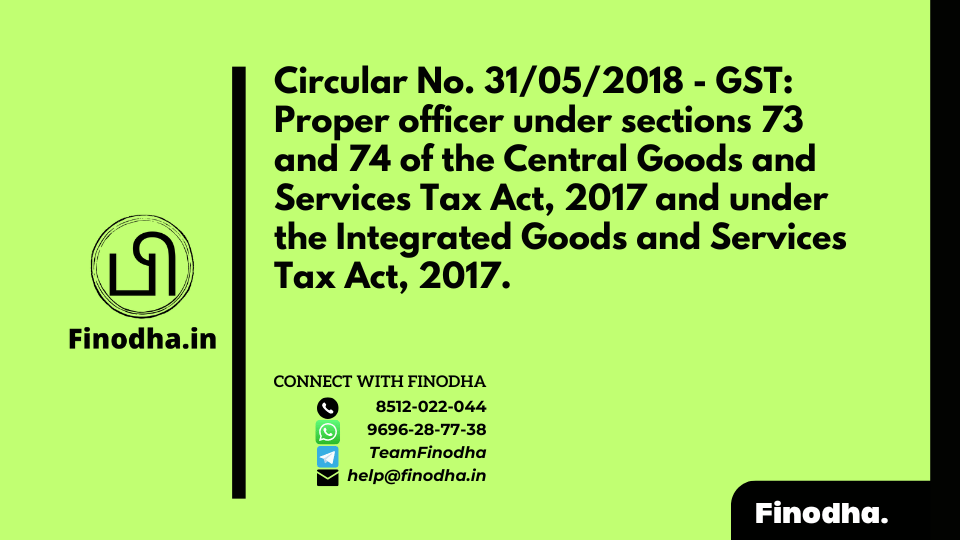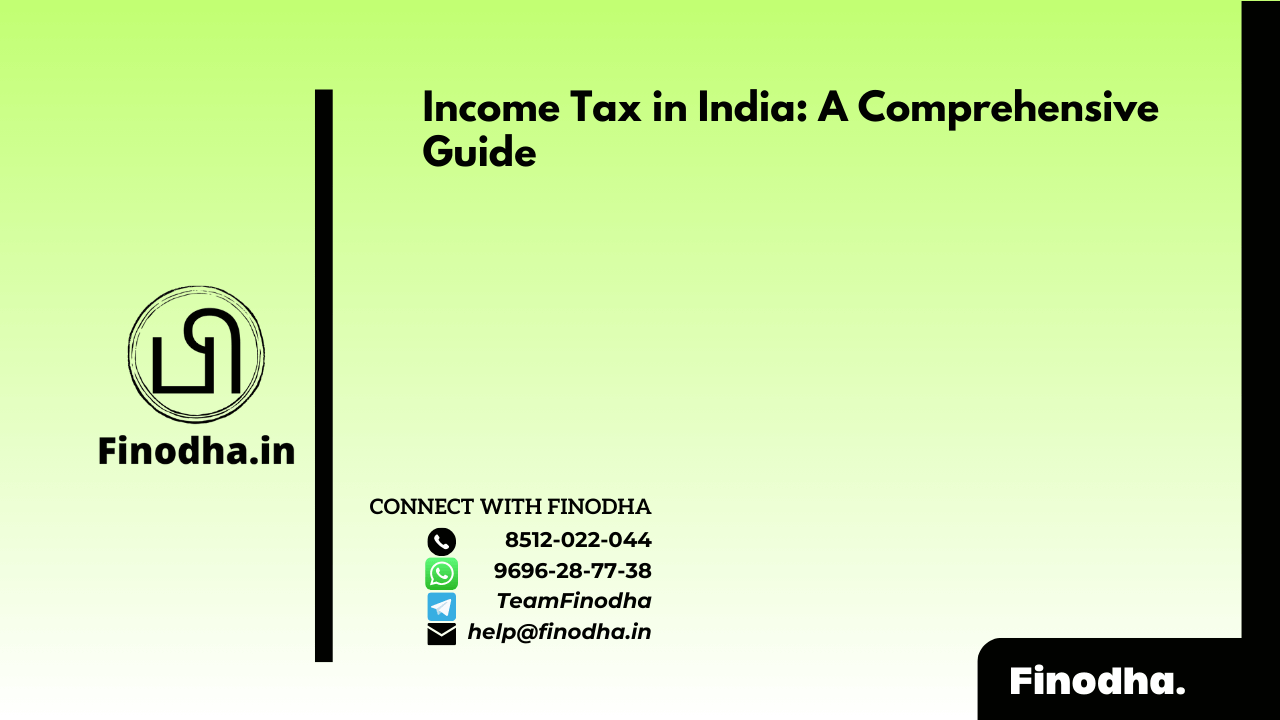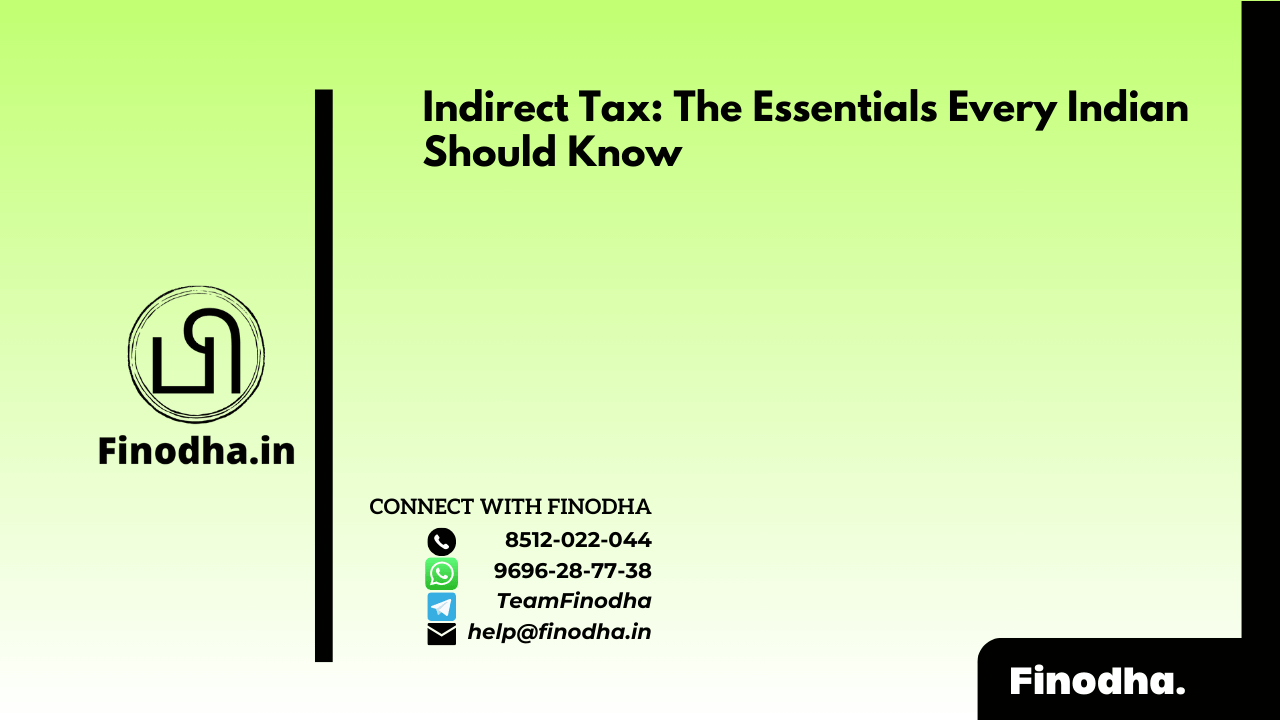Important Keyword: F. No. 349/75/2017 GST, Circular 31/05/2018 GST, Circular No. 1/1/2017 GST, Circular No. 3/3/2017 GST, Section 74 CGST Act, Circular No. 3/3/2017 GST, Section 5(2) CGST Act, Section 2(91) CGST Act, Section 20 IGST Act,
Words: 1,956; Read time: 10 minutes.
Table of Contents
F. No. 349/75/2017-GST
Government of India
Ministry of Finance
Department of Revenue
Central Board of Excise and Customs
GST Policy Wing
***
New Delhi, 9th February 2018
Circular No. 31/05/2018 – GST: Proper officer under sections 73 and 74 of the Central Goods and Services Tax Act, 2017 and under the Integrated Goods and Services Tax Act, 2017.
To,
The Principal Chief Commissioners/Chief Commissioners/Principal Commissioners/ Commissioners of Central Tax / Commissioners of Central Tax (Audit)/ Principal Director General of Goods and Services Tax Investigation/ Director General of Systems
Madam/Sir,
Subject: Proper officer under sections 73 and 74 of the Central Goods and Services Tax Act, 2017 and under the Integrated Goods and Services Tax Act, 2017–reg.
The Board, vide Circular No. 1/1/2017-GST dated 26th June, 2017, assigned proper officers for provisions relating to registration and composition levy under the Central Goods and Services Tax Act, 2017 (hereinafter referred to as the “CGST Act”) and the rules made thereunder. Further, vide Circular No. 3/3/2017 – GST dated 5th July 2017, the proper officers for provisions other than registration and composition under the CGST Act were assigned. In the latter Circular, the Deputy or Assistant Commissioner of Central Tax was assigned as the proper officer under sub-sections (1), (2), (3), (5), (6), (7), (9) and (10) of section 74 while the Superintendent of Central Tax was assigned as the proper officer under sub-sections (1), (2), (3), (5), (6), (7), (9) and (10) of section 73 of the Central Goods and Services Tax Act.
2. It has now been decided by the Board that Superintendents of Central Tax shall also be empowered to issue show cause notices and orders under section 74 of the Central Goods and Services Tax Act. Accordingly, the following entry is hereby being added to the item at Sl. No. 4 of the Table on page number 3 of Circular No. 3/3/2017-GST dated 5th July, 2017, namely:-
| Sl. No. | Designation of the officer | Functions under Section of the Central Goods and Services Tax Act, 2017 or the rules made thereunder |
| (1) | (2) | (3) |
| 4. | Superintendent of Central Tax | viii(a). Sub-sections (1), (2), (3), (5), (6), (7), (9) and (10) of Section 74 |
3. Further, in light of sub-section (2) of section 5 of the Central Goods and Services Tax Act, whereby an officer of central tax may exercise the powers and discharge the duties conferred or imposed under the Central Goods and Services Tax Act on any other officer of central tax who is subordinate to him, the following entry is hereby removed from the Table on page number 2 of Circular No. 3/3/2017-GST dated 5th July, 2017:-
| Sl. No. | Designation of the officer | Functions under Section of the Central Goods and Services Tax Act, 2017 or the rules made thereunder |
| (1) | (2) | (3) |
| 3. | Deputy or Assistant Commissioner of Central Tax | vi. Sub-sections (1), (2), (3), (5), (6), (7), (9) and (10) of Section 74 |
4. In other words, all officers up to the rank of Additional/Joint Commissioner of Central Tax are assigned as the proper officer for issuance of show cause notices and orders under sub- sections (1), (2), (3), (5), (6), (7), (9) and (10) of sections 73 and 74 of the Central Goods and Services Tax Act. Further, they are so assigned under the Integrated Goods and Services Tax Act, 2017 (hereinafter referred to as the “IGST Act”) as well, as per section 3 read with section 20 of the said Act.
5. Whereas, for optimal distribution of work relating to the issuance of show cause notices and orders under sections 73 and 74 of the Central Goods and Services Tax Act and also under the Integrated Goods and Services Tax Act, monetary limits for different levels of officers of central tax need to be prescribed. Therefore, in pursuance of clause (91) of section 2 of the Central Goods and Services Tax Act read with section 20 of the IGST Act, the Board hereby assigns the officers mentioned in Column (2) of the Table below, the functions as the proper officers in relation to issue of show cause notices and orders under sections 73 and 74 of the Central Goods and Services Tax Act and section 20 of the IGST Act (read with sections 73 and 74 of the Central Goods and Services Tax Act), up to the monetary limits as mentioned in columns (3), (4) and (5) respectively of the Table below:-
Table
| Sl. No. | Officer of Central Tax | The monetary limit of the amount of central tax (including cess) not paid or short paid or erroneously refunded or input tax credit of central tax wrongly availed or utilized for issuance of show cause notices and passing of orders under sections 73 and 74 of CGST Act | Monetary limit of the amount of integrated tax (including cess) not paid or short paid or erroneously refunded or input tax credit of integrated tax wrongly availed or utilized for issuance of show cause notices and passing of orders under sections 73 and 74 of CGST Act made applicable to matters in relation to integrated tax vide section 20 of the IGST Act | Monetary limit of the amount of central tax and integrated tax (including cess) not paid or short paid or erroneously refunded or input tax credit of central tax and integrated tax wrongly availed or utilized for issuance of show cause notices and passing of orders under sections 73 and 74 of CGST Act made applicable to integrated tax vide section 20 of the IGST Act | ||||||
| (1) | (2) | (3) | (4) | (5) | ||||||
| 1. | Superintendent of Central Tax | Not exceeding Rupees 10 lakhs | Not exceeding Rupees 20 lakhs | Not exceeding Rupees 20 lakhs | ||||||
| 2. | Deputy or Assistant Commissioner of Central Tax | Above Rupees 10 lakhs and not exceeding Rupees 1 crore | Above Rupees 20 lakhs and not exceeding Rupees 2 crores | Above Rupees 20 lakhs and not exceeding Rupees 2 crores | ||||||
| 3. | Additional or Joint Commissioner of Central Tax | Above crore limit | Rupees without | 1 any | Above crores limit | Rupees without | 2 any | Above crores limit | Rupees without | 2 any |
6. The central tax officers of Audit Commissionerate and Directorate General of Goods and Services Tax Intelligence (hereinafter referred to as “DGGSTI”) shall exercise the powers only to issue show cause notices. A show cause notice issued by them shall be adjudicated by the competent central tax officer of the Executive Commissionerate in whose jurisdiction the noticee is registered. In case there are more than one noticees mentioned in the show cause notice having their principal places of business falling in multiple Commissionerate, the show cause notice shall be adjudicated by the competent central tax officer in whose jurisdiction, the principal place of business of the noticee from whom the highest demand of central tax and/or integrated tax (including cess) has been made falls.
7. Notwithstanding anything contained in para 6 above, a show cause notice issued by DGGSTI in which the principal places of business of the noticees fall in multiple Commissionerate and where the central tax and/or integrated tax (including cess) involved is more than Rs. 5 crores shall be adjudicated by an officer of the rank of Additional Director/Additional Commissioner (as assigned by the Board), who shall not be on the strength of DGGSTI and working there at the time of adjudication. Cases of similar nature may also be assigned to such an officer.
8. In case show cause notices have been issued on similar issues to a notice(s) and made answerable to different levels of adjudicating authorities within a Commissionerate, such show cause notices should be adjudicated by the adjudicating authority competent to decide the case involving the highest amount of central tax and/or integrated tax (including cess).
9. It is requested that suitable trade notices may be issued to publicize the contents of this circular.
10. Difficulty, if any, in implementation of the above instructions may please be brought to the notice of the Board. Hindi version would follow.
(Upender Gupta)
Commissioner (GST)
Frequently Asked Questions
-
What is Circular No. 31/05/2018 – GST about?
Circular No. 31/05/2018 – GST provides guidelines on the designation of proper officers under sections 73 and 74 of the Central Goods and Services Tax Act, 2017, and the Integrated Goods and Services Tax Act, 2017.
-
Who qualifies as a proper officer under the CGST Act 2017?
A proper officer under the CGST Act 2017 is an officer authorized by the government to undertake actions such as assessment, audit, and enforcement as per the provisions outlined in Circular No. 31/05/2018 – GST.
-
What are sections 73 and 74 of the CGST Act 2017?
Sections 73 and 74 of the CGST Act 2017 pertain to the determination of tax not paid or short-paid and the consequences of fraudulent activities, respectively, as detailed in Circular No. 31/05/2018 – GST.
-
How does Circular No. 31/05/2018 – GST impact tax assessments?
Circular No. 31/05/2018 – GST clarifies the roles of proper officers in conducting tax assessments under sections 73 and 74, ensuring compliance with the CGST Act 2017 and the IGST Act 2017.
-
What is the significance of the Integrated Goods and Services Tax Act 2017 in this context?
The Integrated Goods and Services Tax Act 2017 is significant as it complements the CGST Act 2017, and Circular No. 31/05/2018 – GST extends its guidelines to ensure a unified approach to tax administration.
-
Can a proper officer under the IGST Act 2017 take action under both CGST and IGST?
Yes, a proper officer under the IGST Act 2017 can take action under both the CGST Act 2017 and the IGST Act 2017, as outlined in Circular No. 31/05/2018 – GST.
-
What are the consequences of non-compliance as per sections 73 and 74?
Non-compliance with sections 73 and 74 can lead to penalties, legal proceedings, and additional tax liabilities as specified in Circular No. 31/05/2018 – GST.
-
How should businesses prepare for assessments under Circular No. 31/05/2018 – GST?
Businesses should maintain accurate records, ensure timely filing of GST returns, and stay informed about guidelines in Circular No. 31/05/2018 – GST to facilitate smoother assessments.
-
Are there any specific procedures outlined in Circular No. 31/05/2018 – GST for investigations?
Yes, Circular No. 31/05/2018 – GST outlines procedures for investigations, emphasizing the need for proper documentation and adherence to legal protocols under the CGST and IGST Acts.
-
Where can I find more information about Circular No. 31/05/2018 – GST?
More information about Circular No. 31/05/2018 – GST can be found on the official website of the Goods and Services Tax Council or through notifications issued by the Department of Revenue.
Read More: Clarifications regarding GST in respect of certain services as decided in 25th GST Council meeting.
Download Pdf: https://taxinformation.cbic.gov.in/




